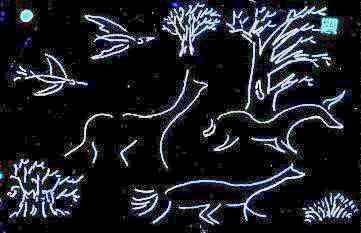
Do you know who you are or what you are? Does it matter?
by Robert Ronald
'Everyone's favorite subject is themselves' so goes the saying. Yet, there is an incredible body of literature from religious figures, social scientists, psychoanalysts, mystics and writers on how to view ones own self and others.
Thus I was much greatful that Bob took the kindness to summarise the various ways of analysing and viewing your own person and that of the other in this comprehensive summary. His impeccable understanding and insights into Chinese culture that he gained through his missionary work in Taiwan allows him to fusion the different personality analyses methods East and West. Be warned, for better or for worse, you will not get through this article without questioning who or what you are. Myself - a tiger - unpredictable, rebellious, colourful, powerful, passionate, daring, impulsive, vigorous, stimulating, sincere, affectionate, humanitarian...as much as I liked this description I thought the most accurate would put myself in between 3 'types' of people in the Enneagram of Personality. ?Nick
Every person is a unique combination of background, experiences, abilities, interests, aspirations, attitudes, temperament, character, behavior traits, ideas and opinions. No two persons are exactly the same, but there are similarities that make it possible to classify types of personality and behavior, such that if you can identify someone’s character traits, you will have a pretty good indication of how he or she will usually react in different kinds of situations, though it is never absolutely certain because the person can always choose to override his or her natural tendencies.
If you have a good idea about what kind of person you are dealing with, it can help you to understand his or her behavior and can tell you what might be the best ways of getting along and interacting with that person. If you know what are your own personality traits, interests and aspirations, potential strengths and weaknesses, then you can take steps to develop those parts that will enhance your success and curb those parts that can impede your progress. In any case, it is very helpful to know who you are dealing with and to be aware yourself of what others see in you.
From time immemorial people have been classifying people and the Chinese are no exception. The cycle of twelve years, each typified by an animal, is supposed to indicate some of the personality traits of those born in each year. Here is a description of the characteristics of each animal (from “Chinese Astrology,” Wikipedia Free Encyclopedia):
鼠 子 Rat: Forthright, disciplined, systematic, meticulous, charismatic, hardworking, industrious, charming, eloquent, sociable, shrewd. Can be manipulative, cruel, dictatorial, rigid, selfish, obstinate, critical, over-ambitious, ruthless, intolerant, scheming.
牛 丑 Ox: Dependable, calm, methodical, patient, hardworking, ambitious, conventional, steady, modest, logical, resolute, tenacious. Can be stubborn, narrowminded, materialistic, rigid, demanding.
虎 寅 Tiger: Unpredictable, rebellious, colorful, powerful, passionate, daring, impulsive, vigorous, stimulating, sincere, affectionate, humanitarian, generous. Can be restless, reckless, impatient, quick- tempered, obstinate, selfish.
兔 卯 Rabbit: Gracious, kind, sensitive, soft-spoken, amiable, elegant, reserved, cautious, artistic, thorough, tender, self-assured, astute, compassionate, flexible. Can be moody, detached, superficial, self-indulgent, opportunistic, lazy.
龍 辰 Dragon: Magnanimous, vigorous, strong, self-assured, proud, direct, eager, zealous, fiery, passionate, decisive, pioneering, ambitious, generous, loyal. Can be arrogant, tyrannical, demanding, eccentric, dogmatic, over-bearing, impetuous, brash.
蛇 巳 Snake: Deep thinker, wise, mystic, graceful, soft-spoken, sensual, creative, prudent, shrewd, ambitious, elegant, cautious, responsible, calm, strong, constant, purposeful. Can be loner, bad communicator, possessive, hedonistic, self-doubting, distrustful, mendacious.
馬 午 Horse: Cheerful, popular, quick-witted, changeable, earthy, perceptive, talkative, agile mentally and physically, magnetic, intelligent, astute, flexible, open-minded. Can be fickle, anxious, rude, gullible, stubborn, lack stability and perseverance.
羊 未 Sheep: Righteous, sincere, sympathetic, mild-mannered, shy, artistic, creative, gentle, compassionate, understanding, mothering, determined, peaceful, generous, seeks security. Can be moody, indecisive, over-passive, worrier, pessimistic, over-sensitive, complainer.
猴 申 Monkey: Inventor, motivator, improviser, quick-witted, inquisitive, flexible, innovative, problem solver, self-assured, sociable, polite, dignified, competitive, objective, factual, intellectual. Can be egotistical, vain, selfish, cunning, jealous, suspicious.
雞 酉 Rooster: Acute, neat, meticulous, organized, self-assured, decisive, conservative, critical, perfectionist, alert, zealous, practical, scientific, responsible. Can be over zealous and critical, puritanical, egotistical, abrasive, opinionated.
狗 戌 Dog: Honest, intelligent, straightforward, loyal, sense of justice and fair play, attractive, amiable, unpretentious, sociable, open-minded, idealistic, moralistic, practical, affectionate, dogged. Can be cynical, lazy, cold, judgmental, pessimistic, worrier, stubborn, quarrelsome.
豬 亥 Boar: Honest, simple, gallant, sturdy, couragous, persevering, resolute, sociable, peace-loving, patient, loyal, hard-working, trusting, sincere, diligent, calm, understanding, thoughtful, scrupulous, passionate, intelligent. Can be naive, over-reliant, self-indulgent, gullible, fatalistic, materialistic.
Can you find yourself in there? I am a monkey and the usual description of people born in monkey years does seem to fit me more accurately than most of the others.
Ancient astrologers divided the heavens into twelve equal divisions according to the elliptical path of the sun through the heavens in the course of a year and gave them special names. Each person, they say, is under the influence of the planets and stars that were dominant in the heavens at the time of his or her birth. Thus, I am a Libra and in general my personality does fit in many particulars what is commonly said of Libras.
When I first came to Taiwan I was often asked by friends what blood type I had, because it was believed that that would tell them something about my personality. I just looked up some information on the internet Wikipedia Free Encyclopedia and discovered that according to a Japanese theory (relating temperament to blood type seems to have originated in Japan) persons with different blood types tend to have different personality traits:
Type A tend to be earnest, creative, sensitive, compassionate and meticulous, but also fastidious, credulous and over-earnest.
Type B are wild, cheerful, active and eloquent, but also selfish, irresponsible, bigoted and reckless.
Type AB (that’s me) show up as cool, controlled, rational, logical and equitable, but also as critical, indecisive, argumentative and cavalier.
Type O (the most common) are supposed to be agreeable, social, optimistic, kind and tough, but also vain, shallow, careless and time serving.
Before you start analyzing your friends, you should know that this theory has generally been repudiated by experts as unscientific and unfounded.
There are however several classifications that do seem to have merit and are based on research. One recently very popular is the Enneagram of Personality. The enneagram is a nine pointed geometric figure and is used symbolically to introduce a set of nine personality types and the relations between them. It was first developed in Chile, then brought to the United States by another Chilean where the idea was taken up and promoted by the Jesuits. The nine types are as follows: (from “Enneagram of Personality,” Wikipedia: The Free Encylopedia)
Ones: Reformers, Critics, Perfectionists. People of this personality type are focused on personal integrity. Ones can be wise, discerning and inspiring in their quest for the truth. They also tend to dissociate themselves from their flaws or what they believe are flaws (such as negative emotions) and can become hypocritical and hyper-critical of others, seeking the illusion of virtue to hide their own vices. The greatest fear of Ones is to be flawed and their ultimate goal is perfection.
Twos: Helpers, Givers, Caretakers. Twos, at their best, are compassionate, thoughtful and astonishingly generous but they can also be particularly prone to clinginess and manipulation. Twos want, above all, to be loved and needed and fear being unworthy of love.
Threes: Achievers, Performers, Succeeders. Highly adaptable and changeable. Some Threes walk the world with confidence and unstinting authenticity; others wear a series of public masks, acting the way they think will bring them approval and losing track of their true self. Threes are motivated by the need to succeed and to be seen as successful.
Fours: Romantics, Individualists, Artists. Fours are driven by the desire to understand themselves and find a place in the world. They often fear that they have no identity or personal significance. Fours embrace individualism and are often profoundly creative and intuitive. However, they have a habit of withdrawing to internalize, searching desperately inside themselves for something they never find and creating a spiral of depression.
Fives: Observers, Thinkers, Investigators. Fives are motivated by the desire to understand the world around them, specifically in terms of facts. Believing they are only worth what they contribute, Fives have learned to withdraw, to watch with keen eyes and speak only when they can shake the world with their observations. Sometimes they do just that. However, some Fives are known to withdraw from the world, becoming reclusive hermits and fending off social contact with abrasive cynicism. Fives fear incompetency or uselessness and want to be capable and knowledgeable above all else.
Sixes: Loyalists, Devil's Advocates, Defenders. Sixes long for stability above all else. They exhibit unwavering loyalty and responsibility, but once betrayed, they are slow to trust again. They are particularly prone to fearful thinking and emotional anxiety as well as reactionary and paranoid behavior. Sixes tend to to react to their fears either in a phobic manner by avoiding fearful situations or by confronting them in a counterphobic manner.
Sevens: Enthusiasts, Adventurers, Sensationalists. Sevens are adventurous and busy with many activities with all the energy and enthusiasm of the Puer Aeternus. At their best they embrace life for its varied joys and wonders and truly live in the moment but, at their worst, they dash frantically from one new experience to another, too scared of disappointment to actually enjoy themselves. Sevens fear being unable to provide for themselves or to experience life in all of its richness.
Eights: Leaders, Protectors, Challengers. Eights value their own strength and desire to be powerful and in control. They concern themselves with self-preservation. They are natural leaders, who can be either friendly and charitable or dictatorially manipulative, ruthless and willing to destroy anything in their way. Eights seek control over their own lives and destinies and fear being harmed or controlled by others.
Nines: Mediators, Peacemakers, Preservationists. Nines are ruled by their empathy. At their best they are perceptive, receptive, gentle, calming and at peace with the world. They also, however, tend to dissociate from conflicts and to indifferently go along with others people's wishes. They may also simply withdraw and act via inaction. They fear the conflict caused by their ability to simultaneously understand opposing points of view and seek peace of mind above all else. Nines are especially prone to dissociation and passive-aggressive behaviour.
Can you see yourself in any of these types? Theorists have also developed elaborate interconnections between one dominant type and certain others. Some critics debunk the entire system. In any case, if you are interested and look at it with an open mind, you might find some insights and advice that might help you.
In 1921 the famous psychologist Carl Gustav Jung published a book about psychological types and an American woman Katherine Cook Biggs together with her daughter Isabel Briggs Myers developed them into a personality type indicator, which evolved into the present day Myers-Briggs Type Indicator (a questionnaire of 88 forced choice items). Mrs. Briggs identified four personality types:Social, Thoughtful, Executive and Spontaneous. Within these types are four pairs of preferences or dichotomies, namely, Extroversion-Introvertion, Sensing-iNtuition, Thinking-Feeling and Judging-Perceiving. If you take the questionnaire your scores will tell you your dominant types and preferences.
A word of caution:The Myers-Briggs type Indicator has developed into a closely guarded business and of course its promotors will praise its accuracy and value, but it also has its share of detractors who criticize it (as well as the Enneagram).
There are two other systems among many available that I have found helpful. One is John J. Holland’s description of six career types and the other Julian B. Rotter’s Locus of Control.
The psychologist John J. Holland identifies six types of occupational orientations, of which two or three types are dominant in each person and according to which it is possible to indicate a person’s most fitting occupational career. In my experience these types are applicable to one’s whole life in general. The Six Holland Codes are as follows (from Holland Codes, Wikipedia Free Encyclopedia):
In 1966 a psychologist Julian B. Rotter brought to popular attention the concept of “locus of control” which introduced his 23 item “Locus of Control Scale” that was designed to indicate the degree to which a person is externally controlled (attribute what happens to their own control associated with higher level of perseverence and determination) or internally controlled (likely to attribute what happens in their lives to luck or external circumstances, often associated with feelings of having no control over their fate and turning to dependence upon external things for support).
Internals are expected to have higher levels of motivations for achievement, greater ability to delay gratification, more tolerance of ambiguous situations and less prone to anxiety and depression, but are also more guilt-prone. They are more open to social support and prefer games of skill.
Externals tend to lower their expectations if faced with delays, are less strong in resisting coertion, more open to depression and feelings of hopelessness, are less inclined to take risks or to work on self-improvement and seem to prefer games of chance or luck.
I have personally found the above classifications useful in understanding myself and others. If you do, too, then fine. But remember this:they are not perfect, not absolute, and not necessarily very accurate for you, because each individual is the product of many influences and variables and each individual has his or her own will power and determination which often is able to overcome expectations and supposed inevitabilities.
There is one other precaution to consider, namely, the Forer Effect. In 1948 the psychologist Bertram R. Forer gave his students a personality test. Then he gave to each student a detailed description of his or her personality traits that he said was based on the test results. Each student was asked to read the description of himself or herself and judge it for accuracy on a scale of 1 (very poor) to 5 (very excellent). Nearly every student believed the description fit very well and the average grade given the accuracy of the description was 4.26. Then Forer revealed that they had all been given the exactly same description as follows:
You have a need for other people to like and admire you, and yet you tend to be critical of yourself. While you have some personality weaknesses you are generally able to compensate for them. You have considerable unused capacity that you have not turned to your advantage. Disciplined and self-controlled on the outside, you tend to be worrisome and insecure on the inside. At times you have serious doubts as to whether you have made the right decision or done the right thing. You prefer a certain amount of change and variety and become dissatisfied when hemmed in by restrictions and limitations. You also pride yourself as an independent thinker; and do not accept others' statements without satisfactory proof. But you have found it unwise to be too frank in revealing yourself to others. At times you are extroverted, affable, and sociable, while at other times you are introverted, wary, and reserved. Some of your aspirations tend to be rather unrealistic.
Forer’s conclusion was that people will readily accept descriptions of themselves if they believe they were written expressly for them, especially when they are vague and general and, I might add, given by someone they respect and have confidence in. The description written by Forer above is certainly vague enough to fit almost anyone.
Therefore before you accept the results of any personality assessment ask yourself if those who prepared the test and wrote the results are qualified and trustworthy. Then how vague or specific are the results? Compare what is said about your characteristics and what is said about other characteristics. If you seem to fit into every category, then the test has little value. If you see yourself mirrored most accurately in those that the results indicate, then the test has some merit.
To conclude where I began:do you know who you are and what you are? Does it matter? It doesn’t matter at all if you aren’t interested or have no desire to know yourself better. It does matter if you would like to understand the dynamics of your character and possibly improve yourself or the way you deal with others. Knowing yourself is a great advantage for being yourself.
Painting by Bendu
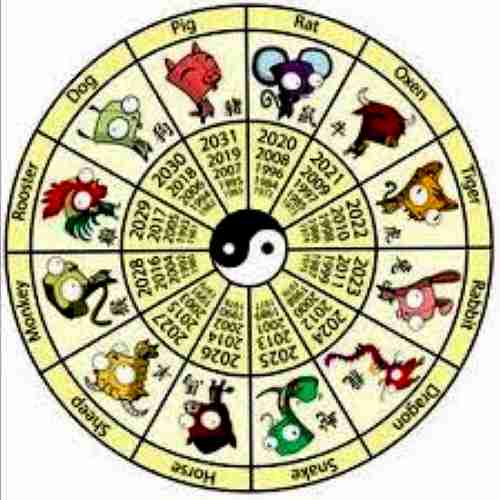 |
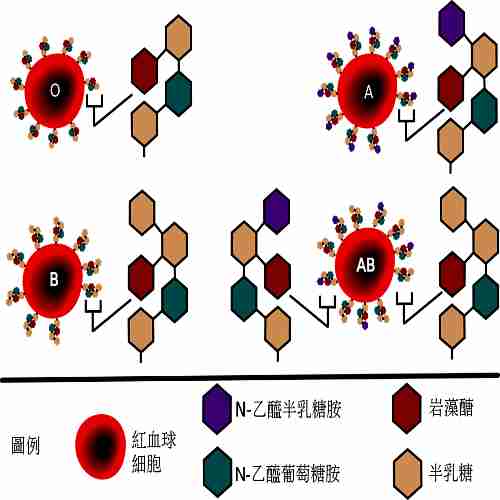 |
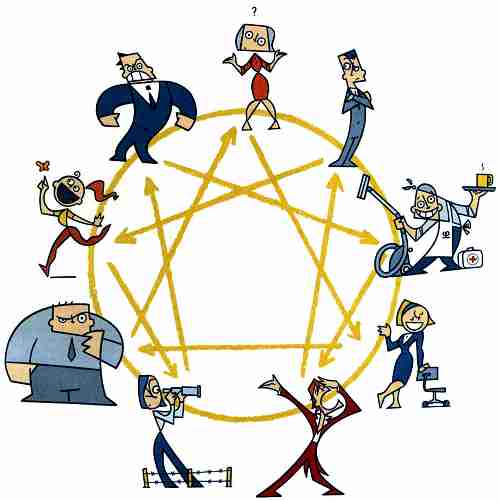 |
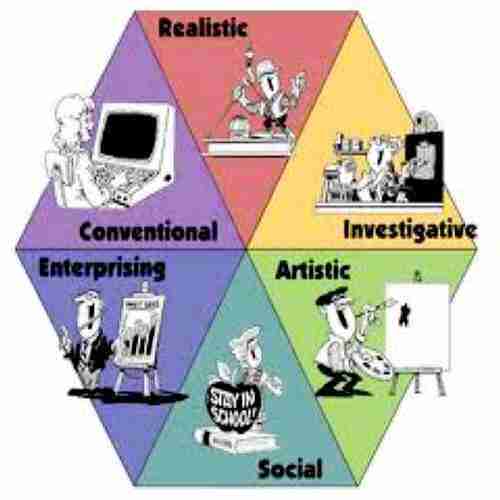 |